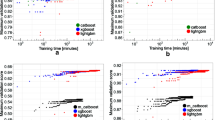Abstract
We study preference representation models based on partial lexicographic preference trees (PLP-trees). We propose to represent preference relations as forests of small PLP-trees (PLP-forests), and to use voting rules to aggregate orders represented by the individual trees into a single order to be taken as a model of the agent’s preference relation. We show that when learned from examples, PLP-forests have better accuracy than single PLP-trees. We also show that the choice of a voting rule does not have a major effect on the aggregated order, thus rendering the problem of selecting the “right” rule less critical. Next, for the proposed PLP-forest preference models, we develop methods to compute optimal and near-optimal outcomes, the tasks that appear difficult for some other common preference models. Lastly, we compare our models with those based on decision trees, which brings up questions for future research.
Similar content being viewed by others
References
Allen, J., Moussa, A., Liu, X.: Human-in-the-loop learning of qualitative preference models. In: The 32Nd International Florida Artificial Intelligence Research Society Conference. AAAI Press (2019)
Ansótegui, C., Bonet, M.L., Levy, J.: A new algorithm for weighted partial maxsat. In: Fox, M., Poole, D. (eds.) Proceedings of the 24th AAAI Conference on Artificial Intelligence. AAAI Press (2010)
Booth, R., Chevaleyre, Y., Lang, J., Mengin, J., Sombattheera, C.: Learning conditionally lexicographic preference relations. In: ECAI, pp 269–274 (2010)
Bräuning, M., Hüllermeier, E., Keller, T., Glaum, M.: Lexicographic preferences for predictive modeling of human decision making: a new machine learning method with an application in accounting. Eur. J. Oper. Res. 258(1), 295–306 (2017)
Breiman, L.: Random forests. Mach. Learn. 45(1), 5–32 (2001)
Felsenthal, D.S., Maoz, Z., Rapoport, A.: An empirical evaluation of six voting procedures: do they really make any difference? Br. J. Polit. Sci. 23(01), 1–27 (1993)
Fraser, N.M.: Ordinal preference representations. Theor. Decis. 36(1), 45–67 (1994)
Gehrlein, W.V.: Condorcet’s paradox and the likelihood of its occurrence: different perspectives on balanced preferences. Theor. Decis. 52(2), 171–199 (2002)
Hurley, B., O’Sullivan, B., Allouche, D., Katsirelos, G., Schiex, T., Zytnicki, M., De Givry, S.: Multi-language evaluation of exact solvers in graphical model discrete optimization. Constraints 21(3), 413–434 (2016)
Lang, J., Mengin, J., Xia, L.: Aggregating conditionally lexicographic preferences on multi-issue domains. In: Principles and Practice of Constraint Programming, pp 973–987. Springer (2012)
Lang, J., Xia, L.: Sequential composition of voting rules in multi-issue domains. Math. Soc. Sci. 57(3), 304–324 (2009)
Liu, X., Truszczynski, M.: Aggregating conditionally lexicographic preferences using answer set programming solvers. In: Proceedings of the 3rd International Conference on Algorithmic Decision Theory, pp 244–258. Springer (2013)
Liu, X., Truszczynski, M.: Learning partial lexicographic preference trees over combinatorial domains. In: Proceedings of the 29th AAAI Conference on Artificial Intelligence, pp 1539–1545. AAAI Press (2015)
Liu, X., Truszczynski, M.: Reasoning with Preference Trees over Combinatorial Domains. In: Algorithmic Decision Theory, pp 19–34. Springer (2015)
Liu, X., Truszczynski, M.: Learning partial lexicographic preference trees and forests over multi-valued attributes. In: Proceedings of the 2nd Global Conference on Artificial Intelligence (GCAI-16), EPiC Series in Computing, vol. 41, pp 314–328. EasyChair (2016)
Liu, X., Truszczynski, M.: Preference learning and optimization for partial lexicographic preference forests over combinatorial domains. In: Proceedings of the 10th International Symposium on Foundations of Information and Knowledge Systems. Springer (2018)
Mattei, N.: Empirical evaluation of voting rules with strictly ordered preference data. In: International Conference on Algorithmic Decisiontheory, pp 165–177. Springer (2011)
Myers, J.L., Well, A., Lorch, R.F.: Research design and statistical analysis. Routledge (2010)
Schmitt, M., Martignon, L.: Complexity of lexicographic strategies on binary cues. Preprint (1999)
Wilson, N.: Preference inference based on lexicographic models. In: Schaub, T., Friedrich, G., O’Sullivan, B. (eds.) Proceedings of the 21st European Conference on Artificial Intelligence, ECAI 2014, Frontiers in Artificial Intelligence and Applications, vol. 263, pp 921–926. IOS Press (2014)
Wilson, N., George, A.: Efficient inference and computation of optimal alternatives for preference languages based on lexicographic models. In: Sierra, C. (ed.) Proceedings of the Twenty-Sixth International Joint Conference on Artificial Intelligence, IJCAI 2017, pp 1311–1317 (2017)
Acknowledgments
The work of the second author was supported by the NSF grant IIS-1618783.
Author information
Authors and Affiliations
Corresponding author
Additional information
Publisher’s note
Springer Nature remains neutral with regard to jurisdictional claims in published maps and institutional affiliations.
This is an extension of the paper that appeared in the proceedings of the 10th International Symposium on Foundations of Information and Knowledge Systems [16].
Rights and permissions
About this article
Cite this article
Liu, X., Truszczynski, M. Voting-based ensemble learning for partial lexicographic preference forests over combinatorial domains. Ann Math Artif Intell 87, 137–155 (2019). https://doi.org/10.1007/s10472-019-09645-7
Published:
Issue Date:
DOI: https://doi.org/10.1007/s10472-019-09645-7
Keywords
- Lexicographic preference models
- Preference learning
- Preference modeling and reasoning
- Social choice theory
- Computational complexity theory
- Voting theory
- Maximum satisfiability




